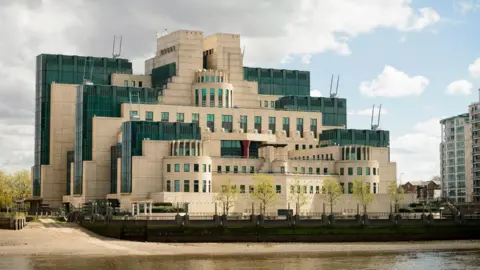In a landmark appointment, MI6, formally known as the Secret Intelligence Service (SIS), breaks from its traditions by appointing Blaise Metreweli as its first female chief in a remarkable 116-year history. This transformative decision marks a significant milestone for the British intelligence community, showcasing the evolving landscape in a historically male-dominated arena. As Metreweli steps into this pivotal role, she becomes the organization’s 18th chief, succeeding Sir Richard Moore, who has led MI6 for five years and will retire later in the year.
Blaise Metreweli’s journey within MI6 began in 1999, and her extensive experience includes her current pivotal role leading technology and innovation strategies at the service. Expressing her sentiments about this new chapter, she stated that she feels both “proud and honored” to take over MI6. The appointment comes at a time when the need for robust intelligence services is more vital than ever, as noted by Prime Minister Sir Keir Starmer, who characterized this transition as “historic.”
The mission of MI6 has always been to gather intelligence from abroad to enhance the UK’s security, with major objectives that include combating terrorism, thwarting hostile state operations, and strengthening cybersecurity initiatives. As the head of MI6, Metreweli, referred to as “C,” carries the unique distinction of being the only publicly named member of the organization. This public status underscores the increasing importance of transparency within intelligence operations to cultivate public trust and understand the complexities surrounding national security.
At 47 years old, Metreweli comes to her new position with an impressive background in the intelligence community, having previously served in leadership roles at MI5, the domestic security agency, with a career marked by assignments in Europe and the Middle East. She studied anthropology at the University of Cambridge and has been recognized for her contributions to British foreign policy, receiving the Companion of the Order of St Michael and St George (CMG) honor in 2024. This accolade speaks volumes about her impact and commitment to national security.
In reflecting upon national security issues, Metreweli has articulated concerns regarding various threats facing the UK, including counter-assassination and protecting sensitive governmental information. She has noted the multifaceted risks posed by state actors such as Russia, which continues to be a pervasive threat, and has emphasized the need for adaptive strategies to meet challenges presented by rapid technological advancements. Addressing these issues has been a focal point for the agency in recent years, especially as adversaries increasingly utilize digital means to compromise security.
Following her appointment, both Sir Richard Moore and Foreign Secretary David Lammy expressed confidence in Metreweli’s capabilities to navigate the complexities of international dynamics. LM noted her as an “ideal” candidate to confront issues such as global instability and emergent security threats. Moore praised her as a “highly accomplished intelligence officer,” reinforcing a recognition that her leadership is anticipated to guide MI6 effectively through turbulent waters.
The challenges ahead for MI6 under Metreweli’s leadership will be considerable. Geopolitical tensions with nations like Russia, China, Iran, and North Korea present severe risks that demand vigilance and strategic countermeasures. Additionally, as the realm of intelligence evolves with the advent of digital technology, adapting to new methodologies in information gathering and analysis will be crucial for MI6’s future efficacy.
As Blaise Metreweli assumes her role, the path she paves will not only shape MI6’s strategies but also signal a progressive shift in traditional structures within intelligence sectors. As the UK faces unprecedented challenges in the global landscape, her leadership presents an opportunity for both innovation and resilience in protecting national interests and ensuring the safety of the British public.



